Committed to Protecting the
Rights of Injured Workers
If you’ve been injured on the job in Illinois, a Chicago workers’ compensation lawyer from IL Work Injury Lawyer can help you pursue the benefits you’re entitled to under the Illinois Workers’ Compensation Act. Our firm has helped countless injured employees across Cook County, DuPage County, and the greater Chicagoland area recover compensation for medical bills, lost wages, and disability.
Whether you’re a construction worker, healthcare employee, union laborer, or anyone else hurt while performing job-related duties, we understand how the workers’ compensation system works and how to hold employers and insurance companies accountable. Contact us today for a free consultation.

At IL Work Injury Lawyer, we have decades of experience representing injured workers and their families in complex, high-stakes workplace injury cases—including those involving the Federal Employers’ Liability Act (FELA), Jones Act, and traditional workers’ compensation claims.
Carlos, a 42-year-old union carpenter, was working on a commercial roofing project in Chicago when he fell through an unsecured section of the roof decking. Despite known safety hazards, no fall protection was in place.
The general contractor had failed to follow OSHA personal protective equipment protocols, and site supervision was minimal. Carlos died from traumatic injuries. His family filed a wrongful death construction accident claim, and the case settled for $11.75 million due to evidence of gross negligence and lack of proper safety equipment.
James, a 39-year-old rail worker, was walking across a yard in Joliet when a truck operated by another contractor struck and killed him. The vehicle was traveling outside designated paths, violating yard safety procedures.
James’s family filed a wrongful death FELA claim. The railroad and the trucking company disputed liability, but surveillance footage and witness statements supported the claim. The case settled for $7.2 million.wrongful death FELA claim.

Marcus, a 31-year-old deckhand, was seriously burned when a fire erupted on deck due to fuel that had been improperly stored near a heat source. He suffered second- and third-degree burns to his arms and legs, requiring multiple surgeries and skin grafts.
The employer failed to follow safety protocols, and fire prevention systems were found to be nonfunctional. Marcus’s Jones Act case resolved for $4 million based on the severity of his injuries and long-term disability.
Anthony, a 45-year-old electrician, was installing cable in a newly constructed warehouse when he fell from a ladder that was not secured on an uneven surface. He sustained spinal fractures and a traumatic brain injury. The general contractor was found liable for failing to maintain safe conditions.
Anthony’s work restrictions prevented him from returning to the trade. His Jones Act claim resulted in a $7.2 million settlement after expert testimony showed long-term loss of earning capacity.
David, a 37-year-old crewmember, was unloading cargo when a poorly secured rack collapsed on him. He suffered extensive injuries to his arm and shoulder, leading to permanent restrictions that disqualified him from returning to rail work.
Under the Jones Act, his attorneys demonstrated negligence in storage practices and a failure to inspect the equipment. The case settled for $3.1 million based on long-term disability and loss of future earnings.
James, a 56-year-old railyard worker, suffered a crushing foot injury when a coworker accidentally dropped a shipping container during a loading operation. The accident led to multiple fractures and permanent damage that ended James’s railroad career.
Under the Federal Employers’ Liability Act (FELA), we demonstrated that his employer failed to provide a safe work environment and adequate supervision. The lifelong impact on James’s mobility and earning capacity helped drive a $2.8 million settlement.
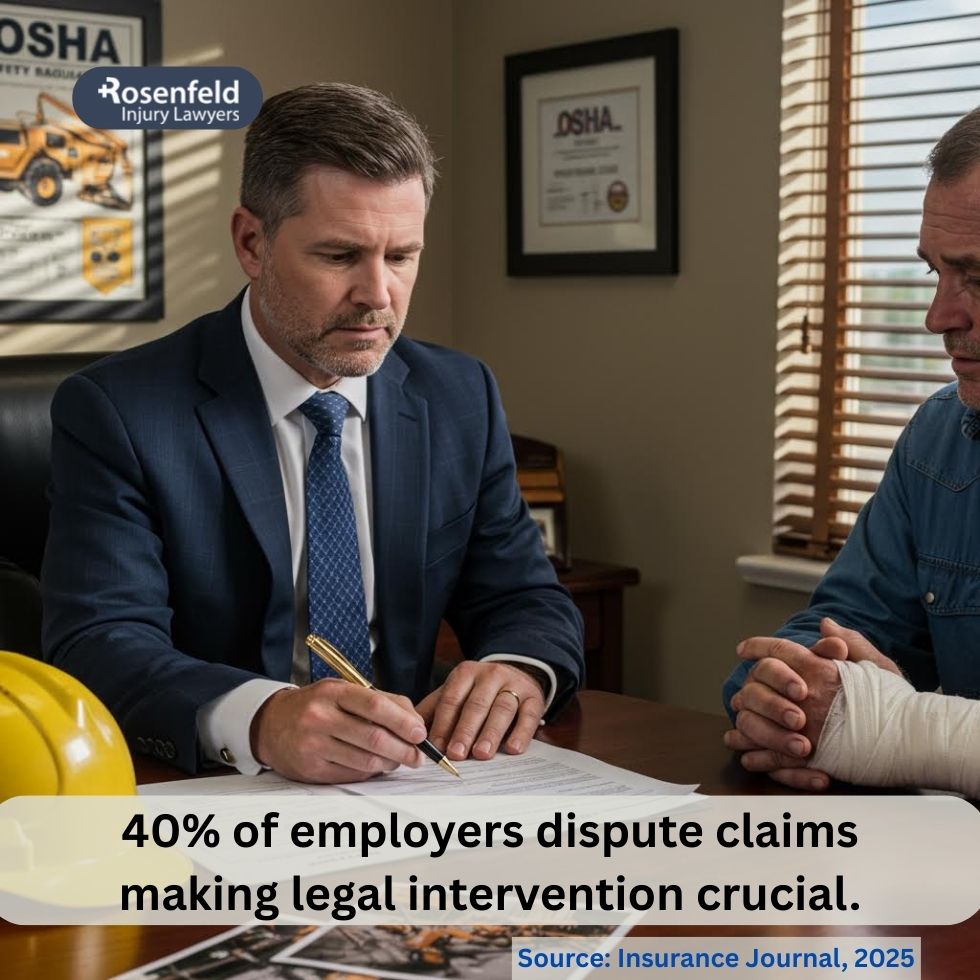
At IL Work Injury Lawyer, we’ve earned a reputation as top Chicago workers’ compensation attorneys by helping thousands of injured employees secure the benefits they deserve. Our team has been recognized by Super Lawyers and the Million Dollar Advocates Forum for excellence in workplace injury litigation.
We handle serious cases involving work-related accidents, repetitive stress injuries, and permanent disabilities under state workers’ compensation laws. We don’t charge any fees unless we recover compensation for you. If you’ve been hurt on the job, contact a best-rated Chicago workers’ compensation attorney for a free consultation and get the legal help you need.

Workers’ compensation is a state-mandated system that provides benefits to employees who suffer work-related injuries or illnesses. The Illinois Workers’ Compensation Act (820 ILCS 305/) requires most employers to carry workers’ compensation insurance to cover medical expenses, lost wages, and disability benefits for injured workers, regardless of who was at fault.
This no-fault system allows injured employees to receive benefits without having to sue their employer. The Illinois Workers’ Compensation Commission (IWCC) oversees claims and disputes. If you’ve been hurt while performing job-related duties, a Chicago workers’ compensation lawyer can help you file a claim and protect your rights.
Not every workplace injury is automatically covered by state workers’ compensation. While most job-related injuries qualify for benefits, there are key exceptions that may prevent a claim from being approved. Understanding these limitations is essential, especially if your employer or their insurer has denied your workers’ compensation claim.
One major exception involves intentional misconduct by the employer. If your employer deliberately caused harm—such as physically assaulting you—you may have the right to file a civil personal injury lawsuit instead of, or in place of, a workers’ compensation claim.
However, you cannot receive workers’ compensation benefits under the Act and pursue damages through a separate personal injury lawsuit for the same incident. The injury must result from purposeful wrongdoing, not negligence or a typical workplace accident.
If your employer fails to carry workers’ comp insurance, as required by Illinois law, you may also be entitled to bring a civil lawsuit. Employers are legally obligated to carry workers’ compensation coverage for all employees. When they don’t, and an injury occurs, the injured worker can seek compensation directly through the courts.
Certain injuries—especially those related to toxic exposure—may not appear for years. Since May 2019, changes to the Illinois Workers’ Compensation Act and the Workers’ Occupational Diseases Act have allowed some workers to file civil claims when a latent injury or illness arises decades later. This includes conditions like mesothelioma or certain cancers linked to job site exposure.
Other exclusions include self-inflicted injuries or death, which are not covered under the Act. If an employee intentionally harms themselves, even at work, they are not eligible for workers’ compensation benefits.
Injuries that occur while the employee is breaking the law or under the influence of drugs or alcohol may also be excluded. If intoxication is determined to be the primary cause of the incident, benefits can be denied. However, if alcohol or drug use did not directly cause the injury, coverage may still apply.
If your case involves one of these complex issues, speak with a knowledgeable Chicago workers’ compensation attorney to understand your legal options and whether a different path—such as a civil lawsuit—may be available.
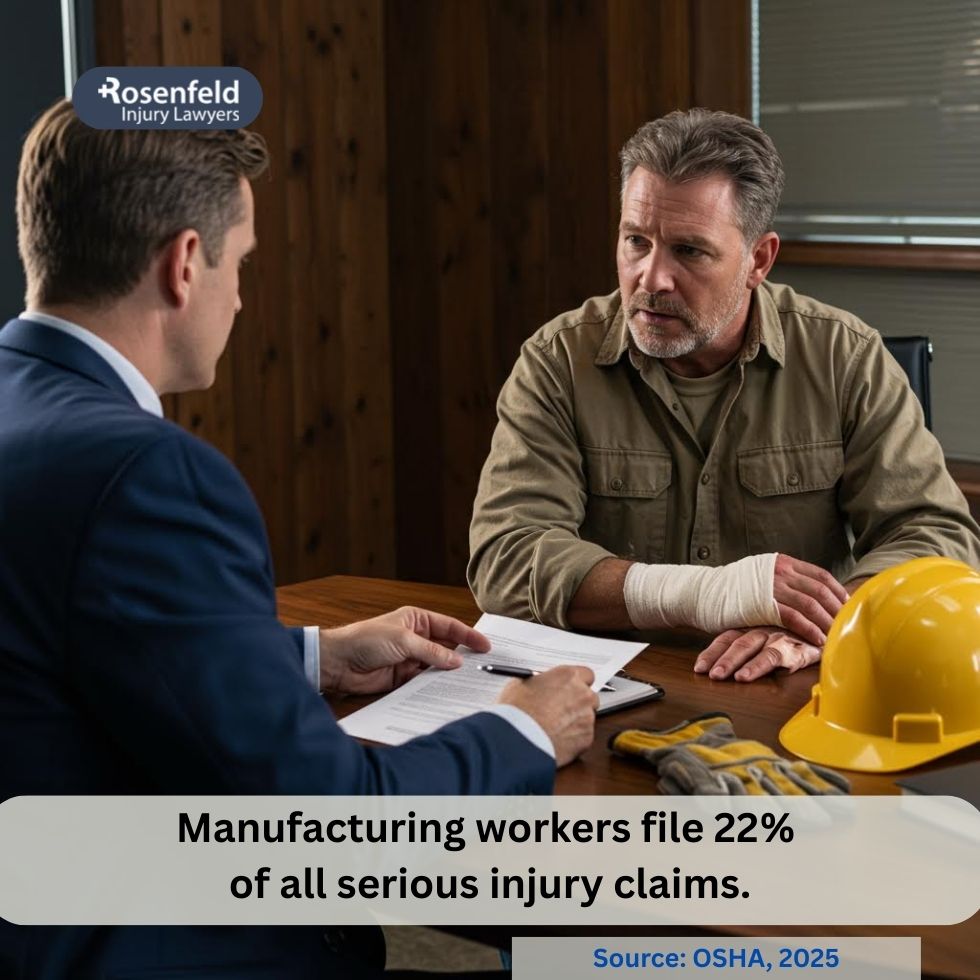
Not everyone who gets injured while performing work-related duties is eligible to receive workers’ compensation benefits under the Act.
While most employees are covered, several categories of workers fall outside the law’s protections, either due to the nature of their employment or because they’re covered under alternative systems. Understanding whether you’re eligible is an important step in protecting your rights after a work injury.
One major group excluded from coverage includes business owners, such as sole proprietors or partners, who have not elected to carry workers’ compensation insurance for themselves. While they may cover their employees, they must actively opt in if they want personal protection.
Independent contractors are also generally excluded, though this often becomes a source of legal disputes. Some employers misclassify workers as independent contractors to avoid paying benefits. If the employer controls how, when, and where you work, you may actually qualify as an employee under the law and be entitled to benefits.
Casual workers—those hired for irregular, short-term, or non-business-related tasks—typically aren’t covered. This includes individuals paid cash for occasional help without a formal employer-employee relationship.
Domestic employees working inside private homes, such as housekeepers, caregivers, or nannies, are usually excluded unless specific conditions are met. Similarly, agricultural workers employed by small family farms may fall outside workers’ compensation coverage, depending on the farm’s size and number of employees.
Certain industries fall under federal laws instead. Maritime workers are usually covered by the Jones Act or the Longshore and Harbor Workers’ Compensation Act, both of which provide injured workers protections separate from state law. Railroad employees are covered under the Federal Employers’ Liability Act (FELA), which allows them to sue for compensation due to employer negligence.
Unpaid volunteers—regardless of how physically demanding the work may be—are not eligible for benefits under the Act because they don’t receive wages or formal employment status.
If you’re unsure whether your role qualifies under Illinois law, consult with an experienced Chicago workers’ compensation lawyer. They can review your situation, help identify misclassification, and determine if another legal avenue may be available to help you recover compensation.
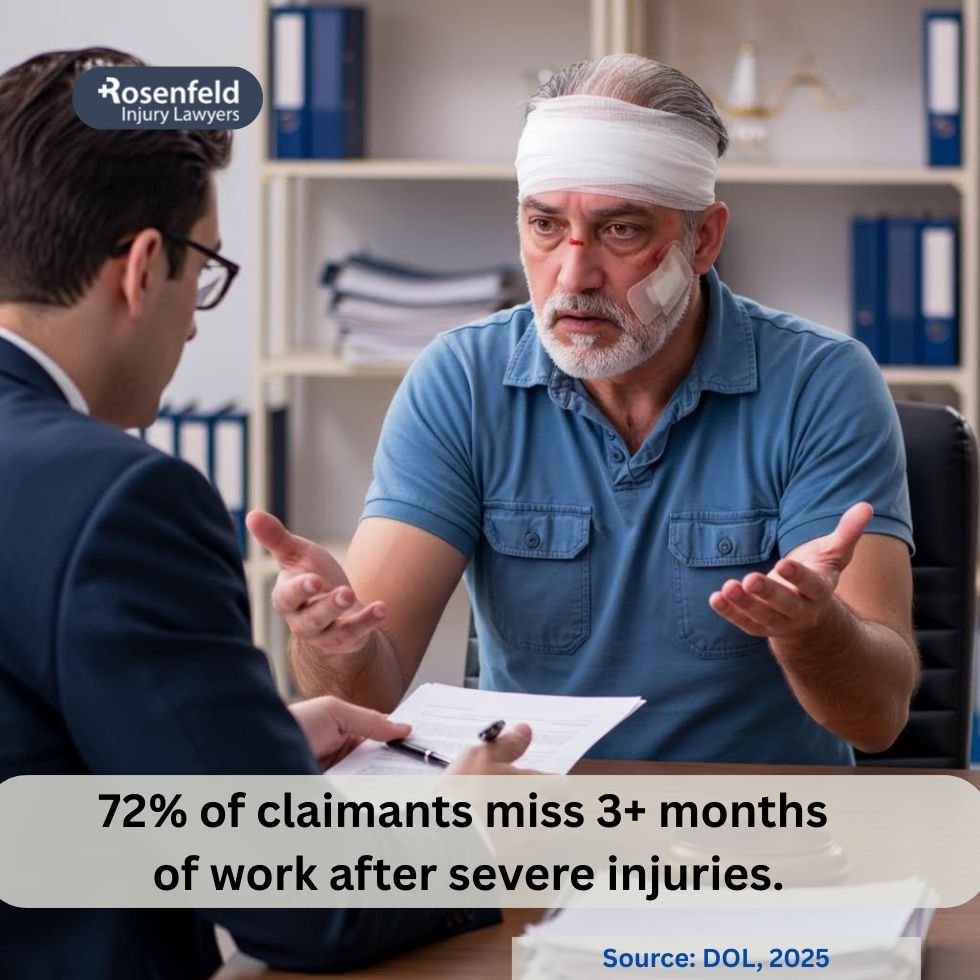
Injured workers in Illinois are entitled to a range of workers’ compensation benefits. A qualified Chicago workers’ compensation attorney can help you determine which benefits apply to your situation and ensure the insurance company pays what you’re legally owed.
TTD benefits are available when a worker is completely unable to perform any job duties during recovery. In Illinois, the benefit is calculated at 66⅔% of the employee’s average weekly wage (AWW). There is a three-day waiting period before payments begin, but if the disability lasts more than 14 days, those first three days are paid retroactively.
Payments continue until the worker reaches maximum medical improvement (MMI) or is medically cleared to return to work. These benefits help injured workers maintain financial stability during periods when they’re physically unable to perform any type of work-related task.
TPD benefits apply when an injured worker can return to part-time or light-duty work but earns less than they did before the injury. In Illinois, the benefit covers two-thirds of the difference between pre-injury and post-injury wages. This helps bridge the income gap during a partial recovery period.
TPD is often used during transitional phases, such as when a worker is under medical restrictions or recovering from surgery. It ensures that workers aren’t penalized financially for following medical guidance while gradually resuming employment duties in a limited or reduced capacity.
PPD benefits support workers who suffer lasting impairments but can still perform some type of work. Illinois law recognizes several types of PPD awards depending on the nature and extent of the injury. Each is calculated differently but provides compensation for permanent damage that doesn’t qualify as total disability. The four primary types of PPD benefits are:
These are based on formulas involving the worker’s average weekly salary and either a schedule of body parts or a medical impairment rating. These benefits help compensate for long-term limitations.
Illinois workers with permanent injuries to specific body parts may receive scheduled loss-of-use awards. The state uses a schedule that assigns a set number of weeks for each affected body part. Compensation is calculated at 60% of the injured worker’s average weekly wage (AWW), multiplied by the number of weeks listed in the schedule.
For example, a complete loss of use of an arm is valued at 200 weeks. If a doctor assigns a 50% impairment rating for the arm, the worker would be entitled to 100 weeks of compensation at the prescribed rate.
Unscheduled awards apply when the injured body part isn’t listed on the state’s schedule—for example, back, hip, or internal organ injuries. The Workers’ Compensation Commission bases these benefits on a percentage of disability applied to a 500-week maximum. The formula is: 60% of average weekly salary × % impairment × 500 weeks.
These benefits provide compensation for permanent injuries that may not be outwardly visible but still result in long-term limitations, discomfort, or functional loss. Unscheduled awards often require a detailed medical impairment rating and may be contested by the insurance carrier.
When an injury prevents a worker from returning to their previous position and results in lower post-injury wages, wage differential benefits help cover that loss. In Illinois, this benefit pays two-thirds of the difference between the injured worker’s pre-injury earnings and what they now make in a new role.
Wage differential benefits can last up to five years or until the worker turns 67, whichever is later. This option is especially helpful for older workers or those whose injuries limit them to lower-paying jobs despite a strong work history or experience in higher-skilled trades.
Disfigurement benefits are available when a worker suffers permanent scarring or visible damage to areas commonly exposed to the public, such as the face, head, neck, arms, or hands. Illinois caps this benefit at 162 weeks, with compensation set at 60% of the injured worker’s average weekly wage.
The severity and location of the disfigurement are key factors in determining the duration of payment. These benefits do not apply to scarring on the torso or legs and are only available if the injury is permanent and apparent. Employers often contest disfigurement claims, making legal guidance important.

PTD benefits apply to injured workers who are permanently unable to return to any type of employment. Illinois provides lifetime weekly payments at 66⅔% of the worker’s average weekly salary. Workers who suffer catastrophic injuries, such as the loss of both hands, arms, feet, or eyes, may automatically qualify for PTD.
Additional benefits may be available under the Second Injury Fund, and a cost-of-living adjustment (COLA) may apply depending on the circumstances. Because PTD has no end date, insurance companies often contest eligibility, making it essential to work with an experienced workers’ compensation attorney.
If a worker cannot return to their former job due to injury, Illinois law provides vocational rehabilitation and maintenance benefits. These may include job training programs, educational services, or job placement assistance. While undergoing rehabilitation, the worker continues to receive weekly maintenance payments equal to the Temporary Total Disability (TTD) rate.
This support is meant to help injured employees transition into new roles that accommodate their physical restrictions while remaining in the workforce. Vocational rehabilitation services are coordinated through the employer’s workers’ compensation insurance but may require legal advocacy if benefits are delayed or denied.
Workers’ compensation law covers a wide range of medical expenses for job-related injuries. This includes emergency room care, surgeries, hospital stays, physical therapy, medication, durable medical equipment, and even mileage reimbursement for travel to medical appointments.
Injured workers may choose up to two doctors, and any referrals from those doctors do not count against the two-doctor limit. All reasonable and necessary treatment is eligible for coverage. Insurers are responsible for payment, but disputes can arise if care is deemed “unnecessary” or “excessive.” Prompt documentation and legal support can help avoid interruptions in treatment.
When a worker dies from a job-related injury or illness, Illinois provides death and survivor benefits to eligible family members. These include weekly payments equal to 66⅔% of the deceased’s average weekly wage for a minimum of 25 years or $500,000, whichever is greater. Additionally, families may receive up to $8,000 in burial expenses.
Dependents typically include spouses, children, or other financially dependent relatives. The death must be clearly linked to work-related causes, and disputes can arise over dependency status or accident responsibility. A workers’ comp lawyer can help ensure the family receives the full benefits they’re owed.
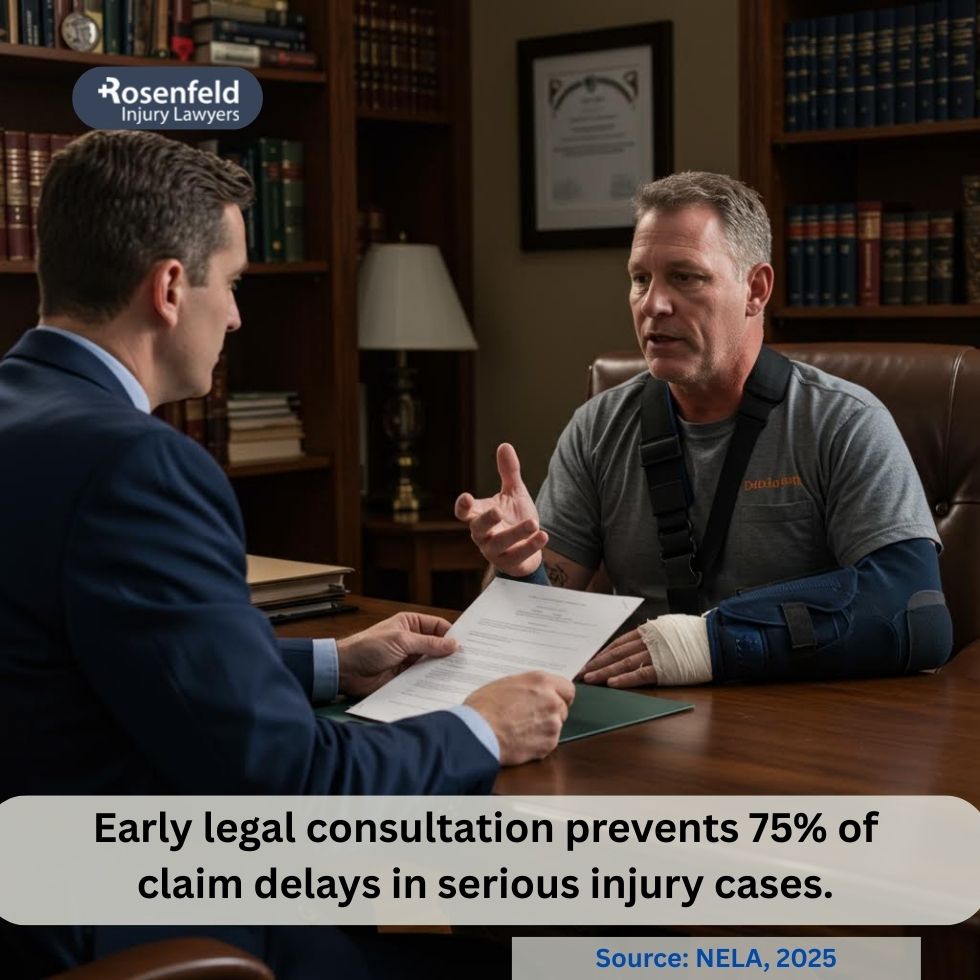
Per Law.com‘s Verdict Search, the average workers’ compensation settlement in Chicago is $563,179, with a median of $255,485. These figures reflect verdicts, settlements, and arbitration awards in Illinois, particularly Cook County.
Settlement amounts vary widely depending on several factors:
A knowledgeable Chicago workers’ compensation lawyer can assess your case value and pursue full benefits, ensuring nothing is left on the table.
Rudolph Francek filed a lawsuit against Dominick’s Finer Foods and Safeway after being fired from his warehouse job shortly following a shoulder injury and filing a workers’ compensation claim. Francek alleged that his termination was in retaliation for exercising his rights under workers’ compensation laws.
His supervisor had changed his leave status without a ruling from the commission, which required him to call in daily. He was fired three days later. The jury sided with Francek, awarding $2,656,315.50, including $2.5 million in punitive damages, despite the defense claiming his termination was due to leave policy violations, not retaliation.
Gary Sperling was working at American Litho when a forklift operated by a Metro Staff Inc. employee backed into him, causing severe crush injuries that led to an above-the-knee amputation. The case hinged on whether the forklift operator was a “loaned servant,” which would have limited Sperling’s remedy to a workers’ compensation claim.
Sperling’s attorneys argued Metro Staff retained control over its worker, and thus, he could sue for employer negligence. The parties ultimately settled for $2 million—the full extent of the defendants’ insurance coverage—due to the catastrophic nature of Sperling’s injury and the liability exposure.
Travelers Indemnity Company sued Midland Logistics and related entities, claiming they misrepresented employee information to reduce workers’ compensation premiums. Travelers had paid out $367,491 in benefits to a mechanic allegedly not covered under the policy. The insurer also claimed that company owner James Gentile committed fraud by hiding affiliated companies.
A jury awarded Travelers $417,491, holding Midland Logistics liable for breach of contract and Midland Transportation for unjust enrichment. Gentile was not found personally liable for fraud. The case spotlighted employer obligations in properly classifying employees for workers’ comp coverage.
While working for Corona Construction, carpenter Dell Tate stepped into a deep, water-filled hole on a poorly maintained construction site in Berwyn, Illinois. Tate sued general contractor Viking Construction and other subcontractors for failing to secure the hazardous area.
Although several defendants won summary judgment, the jury found Viking and Corona each 42.5% liable, and Tate 15% at fault. The jury awarded $310,970.29, which was reduced to $264,324.75 based on Tate’s comparative negligence.
Bruce J. Brummel, a former Nicor Gas employee, claimed prolonged exposure to contaminated drinking water at the company’s Aurora facility caused him to suffer debilitating physical and psychological health issues.
Brummel alleged that toxic chemicals entered the water due to outdated infrastructure. Though Nicor denied liability and pointed to regulatory clearance from OSHA and the EPA, the case settled for $125,000. Brummel received approximately $98,000 after legal fees and medical liens.
Electrician Thomas Rader was injured while working at a Red Lobster construction site in Rockford, Illinois, when he nearly fell through an unguarded portico area. Rader and his wife, Sherri, sued multiple parties, including Brosel, GMRI, and National Exterior, for negligence in maintaining a safe worksite.
The defendants denied liability and blamed Rader for not using proper safety procedures. The parties settled for $115,000. A portion of the award was paid to PEO America, Rader’s statutory employer, as reimbursement under the Workers’ Compensation Act.
Construction worker Jesus Ramon Sanchez fell down a rear exterior stairway while doing rehab work at a Chicago home in December 2004. He sued property owner Dulce Santin for negligence, alleging unsafe stair conditions that violated the local building code. Sanchez claimed injuries to his neck, back, and kidney, incurring over $40,000 in medical bills and $2,000 in lost wages.
The defense argued the accident was Sanchez’s fault and cited state workers’ compensation laws as a defense. A Cook County jury awarded $99,740, reduced by 25% for contributory negligence, bringing the total to $74,805.
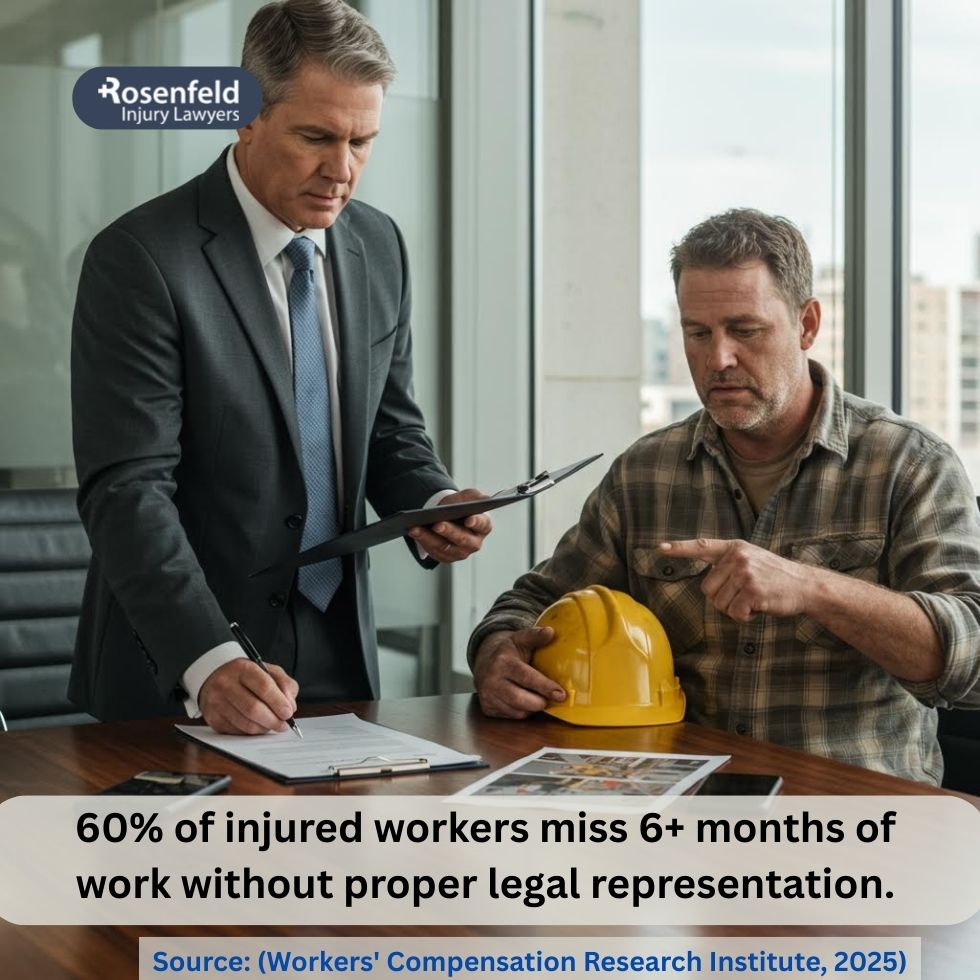
Building a strong workers’ compensation case in Chicago starts with taking the right steps immediately after your injury.
By following these steps, injured workers improve their chances of receiving full medical coverage, lost income, and any other workers’ compensation benefits owed under the law.

In Chicago, injured workers generally have three years from the date of the workplace injury to file a workers’ compensation claim with the Illinois Workers’ Compensation Commission—or two years from the last payment of benefits, whichever is later. This deadline is set under the Illinois Workers’ Compensation statute of limitations, 820 ILCS 305/6(d).
Failing to file within this period can result in losing your right to benefits, even if your injury is legitimate. It’s essential to notify your employer within 45 days of the accident, as failing to do so can also bar your claim.
Filing a workers’ compensation claim in Chicago doesn’t always guarantee a smooth process. Many injured workers face denied or delayed claims or receive settlement offers that fall short of covering the medical bills paid due to the injury and lost earnings.
Insurance companies often dispute the severity of injuries, push back on treatment recommendations, or miscalculate benefits based on an incorrect average weekly wage. These disputes frequently play out before the Workers’ Compensation Commission and, if appealed, in local courts such as the Circuit Court of Cook County.
A seasoned Chicago workers’ compensation lawyer can gather the right medical evidence, challenge improper denials, and advocate for full benefits, including temporary total disability or vocational rehabilitation. Having legal support can make a real difference in the outcome of your case.
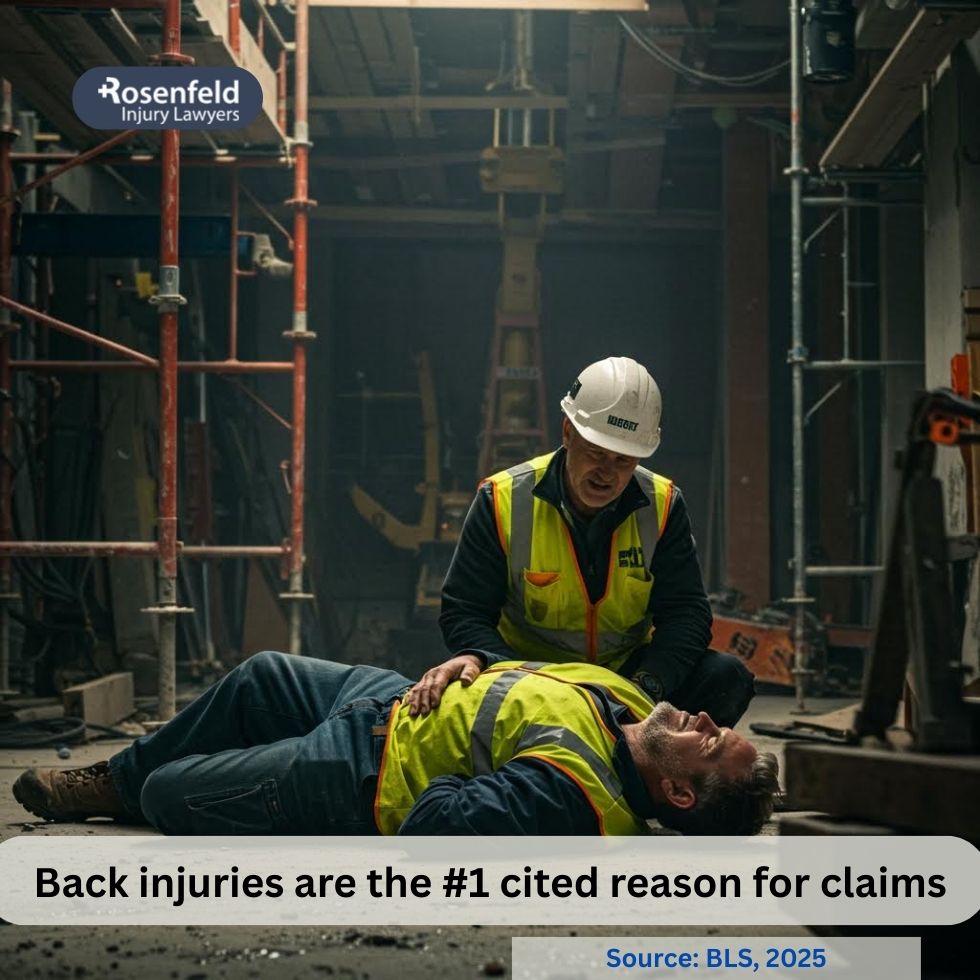
There are legal options outside workers’ compensation for some injured workers in Chicago. These alternative avenues may offer broader compensation, especially when a third party or special employer category is involved.
If your injury was caused by someone other than your employer—like a subcontractor, property owner, or equipment manufacturer—you may be able to file a personal injury lawsuit. This can cover damages not available through workers’ compensation, such as pain and suffering. These claims are common in construction, warehouse, and motor vehicle accidents.
The Jones Act applies to seamen and maritime workers injured while working aboard vessels. Unlike standard workers’ compensation, it allows injured crew members to sue their employer for negligence. To qualify, the worker must spend at least 30% of their time on a vessel. Compensation under the Jones Act can include lost wages, medical care, and damages for pain and suffering.
FELA protects railroad workers injured on the job. Unlike workers’ compensation, FELA requires the injured employee to prove that the railroad was negligent in some way. Successful FELA claims can recover full compensation for medical expenses, lost earnings, and pain and suffering. It provides broader recovery than typical state workers’ comp and applies to nearly all railway employees.
Chicago police officers are not covered by the Illinois Workers’ Compensation Act. Instead, they receive benefits under a separate system managed by the Policemen’s Annuity and Benefit Fund of Chicago. Officers injured off duty may qualify for Ordinary Disability Benefits—50% of their salary for up to five years.
Those injured in the line of duty may receive Duty Disability Benefits, typically 75% of their salary, though this can be reduced to 50% in some cases. Officers with at least 10 years of service who suffer from a disabling heart condition may qualify for Occupational Disease Benefits, which pay 65% of their salary.
Workplace injuries are a persistent issue in Illinois, with BLS workers’ compensation data showing that private industry employers reported over 101,000 nonfatal occupational injuries and illnesses in 2023. This translates to an incidence rate of 2.4 injuries per 100 full-time workers, which mirrors the national average.
Of those cases, 64,500 involved days away from work, restricted duties, or job transfer—a group referred to as DART. That means more than half of all reported injuries in Illinois were severe enough to disrupt a worker’s ability to perform their regular job duties.
Within that group, 42,800 cases resulted in full days away from work, while 21,600 required the employee to either transfer to a different role or accept restricted duties during recovery. An additional 36,900 cases were recorded as work-related injuries that didn’t involve lost time or task reassignment but were still serious enough to require documentation under OSHA regulations.
Certain industries see far higher injury rates than others. In Illinois, the natural resources and mining sector reported the highest rate at 5.5 cases per 100 full-time workers, more than double the statewide average. These jobs often involve high-risk environments such as oil terminals, waste treatment facilities, and environmental cleanup sites in and around Chicago and downstate.
Trade, transportation, and utilities also had a high incidence rate of 3.6, reflecting the dangers faced by workers in major shipping hubs like Chicago’s intermodal yards, warehouse distribution centers, and energy services. Manufacturing followed closely with a rate of 3.1, consistent with the many industrial plants and machinery-heavy operations in areas such as Cicero, Elgin, and the Calumet region.
State and local government jobs, which include sanitation workers, bus drivers, and public maintenance crews, also carried an injury rate of 4.0. These positions, while outside private industry, remain vital to city infrastructure and present their own risks, particularly for employees operating in traffic-heavy or hazardous environments.
Within high-risk industries, certain job roles are more prone to injury. In Chicago, laborers working in construction, public transit maintenance, and utility repair often face unpredictable conditions, heights, and exposure to heavy equipment.
While construction in Illinois had a lower-than-expected rate of 1.9, this may be due to improvements in job site safety, especially on large projects overseen by developers with stronger compliance practices.
Jobs in corrections, law enforcement, and emergency services—many of which fall under city or state employment—ranked among the most dangerous. State government workers, including IDOC and IDOT personnel, saw an injury rate of 4.2 per 100 workers.
Local government employees, including Chicago Streets & Sanitation and Water Management crews, followed closely with a 4.0 rate. These roles often require repetitive lifting, exposure to volatile environments, and, in many cases, insufficient staffing—factors that directly contribute to increased injury risk.
Workers in distribution hubs such as O’Hare’s cargo facilities or Amazon’s fulfillment centers are also regularly impacted by strains, overuse injuries, and forklift-related incidents, mirroring the elevated injury rates seen in transportation and warehousing sectors statewide.
Chicago workers across industries—from construction and manufacturing to healthcare and office jobs—are exposed to a variety of workplace hazards. These hazards can lead to injuries ranging from mild to life-threatening. Understanding the most common types of workers’ compensation injuries is key to recognizing when you may be eligible for compensation.
Common in office settings, warehouses, and health care, repetitive stress injuries develop over time due to repeated movements or physically demanding tasks.
Chicago workers in industrial plants, hospitals, and custodial roles face elevated risks of long-term health conditions due to exposure.
Many labor-intensive jobs in Chicago—like construction, transportation, and warehouse roles—carry a high risk of trauma.
These remain one of the leading causes of serious injuries across nearly all sectors, including construction, retail, hospitality, healthcare workers, and city maintenance.
Often occurring in manufacturing plants, loading docks, or construction sites around Chicago.
Construction workers, electricians, and industrial laborers are at greatest risk of burns, such as:
Security guards, hospital staff, teachers, and public-facing employees are more likely to face these risks.
Tragically, some Chicago workers lose their lives on the job, especially in high-risk sectors.
Injured workers often face delayed claim processing, denied benefits, or underpaid settlements. Insurance companies may argue that the injury wasn’t work-related or that medical treatment is unnecessary. Some employers may fail to report the injury properly or dispute the extent of your disability.
Our top-rated Chicago workers’ compensation attorneys step in by gathering detailed medical records, securing expert opinions, and holding employers accountable for failing to follow state workers’ compensation law.
We negotiate directly with insurance companies, file claims with the Workers’ Compensation Commission when necessary, and represent clients in hearings and appeals. Our law firm works to recover full benefits, including lost wages, medical expenses, and compensation for temporary or permanent disability.
A workers’ compensation attorney helps injured employees at every stage of the claim process.
From the start, we ensure your injury is properly documented and reported, assist with filing your workers’ compensation claim, and communicate directly with the insurance company to avoid delays or denials. If your claim is denied or undervalued, we represent you before the Workers’ Compensation Commission and handle all appeals.
We gather supporting medical records, calculate lost wages, and make sure your average weekly wage is accurately determined. Our legal team also helps determine if you’re eligible for additional benefits like vocational rehabilitation or permanent disability. If a third party is responsible for your injury, we can pursue a personal injury lawsuit for added compensation.
Most Chicago workers’ compensation attorneys, including our firm, work on a contingency fee basis. This means you don’t pay anything upfront. Instead, your lawyer receives a percentage—typically 20%—of the benefits recovered. This structure allows injured workers to get legal help without added financial stress.
If your case isn’t successful, you owe nothing. Illinois law caps attorney fees for workers’ compensation claims, so you’re protected from excessive charges. During your free consultation, we’ll explain how fees work and answer any questions you have.
Any employee injured while performing job-related duties in Chicago can file a workers’ comp claim under the Illinois Workers’ Compensation Act. This includes full-time, part-time, seasonal, and union workers.
Some workers, such as independent contractors and certain exempt professions, may not qualify, but it’s not always clear-cut. If you’re unsure about your employment classification, a workers’ compensation lawyer can help determine your eligibility and protect your right to receive benefits like medical coverage and lost wages.
If your injury prevents you from working, workers’ compensation pays a portion of your wages. Temporary total disability (TTD) benefits cover two-thirds of your average weekly wage. These benefits begin after a three-day waiting period unless your disability lasts more than 14 days, in which case you’ll be paid retroactively.
Your employer’s workers’ compensation insurance company is responsible for these payments. If there’s a delay or denial, a workers’ compensation attorney can push for the full compensation you’re entitled to.
Workers’ compensation benefits cover a wide range of long-term and permanent impairments. If your injury results in lasting damage, you may qualify for permanent partial disability (PPD) or permanent total disability (PTD) benefits.
Compensation can include wage differential payments, scheduled loss awards, and lifetime benefits if you’re unable to return to any job. A skilled workers’ comp lawyer will help determine which benefits apply based on your injury, medical condition, and employment history.
If you can’t return to your previous job, you may be eligible for vocational rehabilitation benefits. These include job retraining, placement assistance, and educational support to help you find suitable employment. While you’re in the program, you can receive maintenance benefits, which are equal to your TTD payments.
Your employer may also offer a light-duty position. A Chicago workers’ compensation attorney can help ensure that any job change doesn’t unfairly lower your long-term earning potential.
Yes, but it’s typically not the first option. Illinois law requires your employer’s workers’ compensation insurance to cover medical treatment for job-related injuries. If you use your personal health insurance, it may deny coverage or seek reimbursement later.
Workers’ compensation should pay for emergency care, doctor visits, surgeries, medications, and more. If there’s a delay or denial from the insurance company, speak with a Chicago workers’ compensation attorney to avoid out-of-pocket expenses and protect your right to full medical benefits.
Start by notifying your employer within 45 days of the injury. While verbal notice is allowed, written notice is recommended. Include the date, time, and nature of the accident. After that, your employer should file a claim with their insurance provider.
If they fail to do so, or if benefits are delayed or denied, you can file a claim with the Workers’ Compensation Commission. A Chicago workers’ compensation attorney can assist with documentation, deadlines, and advocating for your benefits throughout the process.
No, it’s illegal in Illinois for an employer to fire or retaliate against an employee for filing a workers’ comp claim. If you’re terminated shortly after reporting a job-related injury, it could be grounds for a retaliatory discharge lawsuit.
In such cases, you may be entitled to additional compensation. If you’re concerned about retaliation or have already lost your job after filing a claim, consult with a workers’ compensation lawyer immediately to protect your rights and take appropriate legal action.
Workers’ compensation in Illinois covers both sudden injuries and chronic conditions that develop over time. This includes repetitive stress injuries like carpal tunnel syndrome, as well as occupational diseases from prolonged exposure to harmful substances, such as asbestos.
The key factor is whether the condition was caused or worsened by your job duties. Because chronic conditions can be harder to prove, it’s important to seek medical care early and document your symptoms. A workers’ compensation attorney can help gather the evidence needed to support your claim.
Generally, no. State workers’ compensation laws prevent injured workers from suing their employer directly, even if the employer was negligent. However, there are exceptions, such as if your employer doesn’t carry workers’ comp insurance or if the injury resulted from intentional harm.
In some cases, a third-party lawsuit may also be possible. Unlike personal injury claims, workers’ comp doesn’t require proof of fault. A Chicago workers’ compensation attorney can review your case to see if other legal options are available.
While you’re not legally required to hire an attorney, working with a workers’ compensation lawyer often leads to better outcomes. Insurance companies may underpay or deny claims, especially if your injuries are serious or long-term.
A lawyer helps ensure you receive all available benefits, handles appeals, gathers medical evidence, and negotiates settlements. If your case involves disputed facts, missed work, permanent disability, or retaliation, legal guidance becomes even more important.
In Illinois, you have the right to choose your own doctor—up to two different physicians—under the Illinois Workers’ Compensation Act. Any referrals made by your chosen doctor don’t count against that limit.
However, some employers have a Preferred Provider Program (PPP), which may limit your options unless you opt out in writing. Always check whether your employer participates in a PPP and consult a workers’ compensation attorney if you’re being pressured to see a company-selected provider.
Yes. Under Illinois law, immigration status does not affect your right to receive workers’ compensation benefits. Undocumented workers injured while performing job-related duties are entitled to the same benefits as other employees, including medical care, lost wages, and disability benefits.
Employers cannot deny benefits based on your immigration status, and any retaliation for filing a claim may be grounds for additional legal action. If you’re facing pressure or threats, consult a workers’ compensation lawyer immediately.
It’s illegal for an employer to discourage you from filing a workers’ comp claim or to retaliate against you for doing so. Retaliation can include termination, demotion, pay cuts, or harassment. If you feel threatened or intimidated after reporting a work-related injury, document everything and contact a workers’ comp lawyer.
Illinois law protects injured workers, and you may have a separate legal claim if your employer interferes with your rights under the Illinois Workers’ Compensation Act.
No, the injury doesn’t have to occur at your main job site. As long as you were performing job-related duties at the time, you may still qualify for benefits. This includes injuries sustained while traveling for work, at off-site locations, or during employer-approved tasks.
For example, if you’re a delivery driver or technician injured at a customer’s location, the workers’ compensation system should still apply. A lawyer can help prove employer negligence and its connection to your injury.
Yes, in most cases you can switch. Under state workers’ compensation law, injured workers are allowed to select up to two doctors of their choice, along with any specialists those doctors refer them to.
If you initially saw a doctor provided by the insurance company or employer, that may count as one of your two choices—unless you were pressured or didn’t voluntarily choose that provider. A workers’ compensation lawyer can help clarify your rights and ensure your care isn’t compromised.
Yes, you can apply for Social Security Disability Insurance (SSDI) if your workplace injury results in permanent inability to return to work. Workers’ compensation and SSDI are separate programs, and you may qualify for both.
However, SSDI benefits may be reduced if you’re receiving workers’ comp. A Chicago workers’ compensation attorney can help coordinate your claim and maximize your total recovery without jeopardizing either source of compensation.
Your employer’s workers’ compensation insurance carrier is typically responsible for paying your benefits. Illinois law requires most employers to carry workers’ comp insurance, which covers medical expenses, lost wages, and disability benefits for injured workers.
If the employer is self-insured, they may pay benefits directly. If you’re having trouble receiving timely payments or medical coverage, an attorney can help ensure the insurance company complies with the state workers’ compensation law.
You should be cautious before signing any medical release form provided by the insurance company. Some releases may be overly broad and give them access to unrelated or private medical information. It’s best to have a workers’ compensation lawyer review the form first.
Illinois law allows insurers limited access to records relevant to your work injury, but not your entire medical history. Protecting your privacy helps prevent claims from being wrongly denied or delayed.
Yes. In Illinois, you have the right to choose your own doctor, unless your employer participates in a Preferred Provider Program (PPP). If no PPP exists, you can select two doctors, and any specialists they refer you to do not count against that limit.
If a PPP is in place, you must opt out in writing to use your own provider. A workers’ compensation attorney can help if you’re unsure of your rights or if your employer is trying to restrict your medical care.
A failed drug test can complicate your workers’ comp claim, but it doesn’t automatically disqualify you. Under Illinois law, if an employer can prove your intoxication was the sole cause of the accident, benefits may be denied.
However, the burden is on the employer or insurer to establish that link. If you failed a drug test but believe the substance didn’t cause the accident—or if the test was unfairly administered—you should speak with a Chicago workers’ compensation lawyer immediately to protect your rights.
Yes. If your job aggravated or worsened a pre-existing condition, you may still be eligible for workers’ compensation benefits in Illinois. The key factor is whether the work-related activity contributed to your current condition or increased your level of disability.
Insurance companies often try to deny claims by blaming old injuries or medical issues, so documenting how your work made the condition worse—and working with a skilled attorney—can significantly improve your chances of a successful claim.
Illinois law requires nearly all employers to carry workers’ compensation insurance. If your employer failed to comply, they can face serious penalties, including fines and criminal charges. As an injured worker, you may be able to seek compensation through the Illinois Injured Workers’ Benefit Fund (IWBF).
This fund helps injured employees whose employers were uninsured at the time of the accident. A workers’ compensation attorney can help you file a claim through the IWBF and hold your employer accountable for noncompliance.
Workers’ comp claims don’t require proof of negligence and are limited to benefits like medical expenses, lost wages, and disability. Unlike personal injury lawsuits, you can’t seek pain and suffering or punitive damages. You also generally can’t sue your employer if they carry workers’ comp insurance.
However, if a third party (like a subcontractor or equipment manufacturer) caused your injury, you may have the right to file a personal injury lawsuit in addition to your workers’ comp benefits.
An independent medical exam (IME) is a medical evaluation requested by the workers’ compensation insurance company. The purpose is to assess the extent of your injuries and whether they are work-related.
While the exam is labeled “independent,” the doctor is selected and paid by the insurance company. Their findings can impact your benefits, so it’s important to prepare carefully. A Chicago workers’ compensation attorney can explain what to expect and help challenge any biased or inaccurate IME results.
In Illinois, workers’ compensation benefits begin after a waiting period of three workdays. If you’re unable to work for more than 14 calendar days, the benefits for those first three days become payable retroactively. Payments typically cover two-thirds of your average weekly wage, up to a state-set maximum.
The timing can vary depending on how quickly your employer reports the injury and how the insurance company processes your claim. If there are delays or disputes, a workers’ compensation lawyer can step in to push for timely payments.
Yes. Illinois law recognizes that work-related injuries can occur outside traditional job sites, including at home. To qualify for workers’ compensation benefits, you must show that the injury happened while performing tasks related to your job duties.
For example, if you slipped while carrying work documents or developed a repetitive strain injury while typing, you may be eligible. Insurance companies may push back on these claims, so it’s helpful to document the circumstances clearly and consult with a workers’ comp attorney familiar with remote work cases.
The time to settle a workers’ compensation case in Chicago varies. Simple cases involving minor injuries may resolve in a few months, while more serious or disputed cases can take a year or longer. Delays often stem from ongoing medical treatment, disagreements over disability ratings, or insurer resistance.
Once you reach maximum medical improvement (MMI), your lawyer can negotiate a settlement that reflects the extent of your injury and future needs. An experienced Chicago workers’ compensation attorney can speed up the process and protect your interests.
Before accepting a settlement offer, it’s wise to consult with a work injury lawyer. Insurers often offer less than what your claim is truly worth, especially if future medical care or wage loss is likely.
Once you agree to a settlement, you generally give up the right to ask for more later, even if your condition worsens. A skilled attorney can evaluate whether the offer fairly compensates you for lost income, medical costs, and any permanent impairment based on Illinois law.
Be honest and specific with your doctor about how the injury happened, what symptoms you’re experiencing, and how the injury affects your ability to work. Include details like the date, time, location, and tasks you were performing. This medical documentation plays a key role in your claim.
If the insurance company sees inconsistencies between your report and the medical records, they may use that to deny or delay benefits. Clear, accurate communication with your doctor helps strengthen your workers’ compensation case.
If you have suffered injuries on the job, don’t face the workers’ compensation system alone. An experienced Chicago workers’ compensation attorney can help you secure the benefits you’re entitled to—whether you’re dealing with denied medical bills, lost income, or permanent disability.
At IL Work Injury Lawyer, we work on a contingency fee basis, meaning you pay nothing unless we recover compensation for you. We represent injured workers throughout Cook County and the greater Chicago area. Contact us today to schedule your free consultation and get the help you deserve.
Content reviewed by Chicago work accident lawyer Jonathan Rosenfeld of Rosenfeld Injury Lawyers LLC, who holds employers, contractors, and third-party defendants accountable to recover compensation for injured workers, and is a trial lawyer recognized by the Illinois Trial Lawyers Association, the Illinois Workers Compensation Bar Association, and America’s Top 100 High Stakes Litigators.